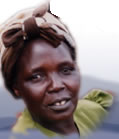THEMES IN THIS
TESTIMONY
Communications

Culture and Customs

Development

Education

Environment

Family Life

Land

Livestock

Politics

Click on arrows
to find more
testimonies
featuring
these themes
|
|
Sex
|
Male
|
|
|
Age
|
57
|
|
|
Identity
|
Sabaot
|
|
|
Occupation
|
Retired primary school teacher
|
|
|
Location
|
Kapsokwony
|
|
|
Date
|
November 1996
|
|
summary
An informative interview that provides plenty of interest. It covers changing attitudes to education amongst the Sabaot, general development in the region, and on the origins of conflict with the Bukusu. Masai gives us an unusual perspective on the first point as he claims to have been one of the first Sabaot to be educated in the area, and not only was he unpopular and shunned as a result, but his parents were thought mad to struggle to find the resources to pay his school fees. Masai points out that his father only changed his mind to a positive view of education thanks to his Bukusu friends who advised him on the value of education. This is particularly interesting in the light of his later comments on how it is impossible for Sabaot to live in peace with Bukusu. This interview highlights the recurrent theme throughout the testimonies of the Sabaot ambivalent attitudes to education and changes brought from outside.
detailed breakdown
|
You will need a password from Panos to view the full
transcript of the interview. To apply for a password, click here.
Once you have a password, click here to go to the beginning
of the transcript. You can also click on any section of the
breakdown of content below and go straight to the
corresponding part of the transcript.
|
| Section 1-4 |
Educational history how children were forced to go to school when he was young. The narrator liked school despite his parents disapproval. At one point he was the only Sabaot in the school and all his teachers were Bukusu the narrator felt it was for this reason that he was then denied access to a better school. How his father changed his mind about education after he had lived away in a Luhya area for a while: ...he had been socialised into liking education and he had realised that education might be beneficial to his children in future. The narrator had Bukusu friends who helped him in his studies. Travelled to Uganda several times to pursue his education. Met further discrimination in education as a Sabaot at the secondary level.
|
| Section 4 |
Became a primary school teacher. The Sabaot initial lack of interest in education: During my time, we had very few Sabaot going to school ....People that time looked at success in terms of the number of livestock one owned. And this time you should be aware that one did not require education to command a big herd of cattle! In fact those who had gone to school had depleted their herds. How the community disapproved: When I was in school my father was warned against wasting his livestock to pay my fees. Many people were not happy with my going to school and they saw me as punishing my parents....But my father stood firm and never listened to them because he had Bukusu friends who advised him on the value of education. The narrator was shunned by his agemates who were not educated most of his classmates were non-Sabaot.
|
| Section 4-5 |
Change in the Sabaot communitys attitude to education over the years due to decline in pastoralist lifestyle: Right now the population has increased and there is no space for keeping large herds. This has made it imperative for many people to go to school so that they are able to gain employment. More schools have been built and the narrator states that the Sabaot have...discovered that the power of the pen is mightier than a herd of cattle.
Centrality of education in the Sabaot concept of development. Need for more educated local people to fill positions in the administration of the district.
|
| Section 5-6 |
Discussion of what development is needed: more schools and an increase in educated Sabaot filling in teaching and office positions; the construction of roads; their own markets so as to cut down on travel; changes in farming patterns; more, better-equipped hospitals. View that the Sabaot feel that they have been ignored by the government and that they have been failed by their leaders: ...it is our leaders who have let us down because most of the time they are preoccupied with the squabbles among themselves.
|
| Section 7-8 |
Feels that most beneficiaries of the thing that can bring development in our area are outsiders. For example, if one goes to our forest, the Sabaot are not mining timber, but outsiders are doing it and going away with the timber.
The narrator feels that the Sabaot elite need to organise themselves into an association to defend their rights: People should be told that Sabaot land right now is very small and we are just living on a mountain strip. You the youth, should ask yourselves where you will live and where your children will live too. For the Sabaot have been pushed to the foot of the mountain.
Reasons why they have lost land: pastoralist lifestyle allowed outsiders to settle easily; oppression by a Bukusu chief, and by other settlers; and lack of educated Sabaot and continued oppression by Bukusu hindered their ability to reclaim their land.
|
| Section 8-10 |
Discusses the conflict between Bukusu and Sabaot - blames it on the Bukusu oppression: The community [Sabaot] was very positive about the objectives of the war. Bad relationship between the two sides still exists. How the conflict has led to the Sabaot acquiring their own district, but they still feel discriminated at the provincial level due to having only one MP.
|
| Section 10-11 |
Old marriage traditions.
|
| Section 11 |
How Sabaot used to think boys were more important than girls because the boy carried the family name and would defend the community in times of war. Believes that the Sabaot have not changed much on that issue though he believes that all children are equal.
|
| Section 11-12 |
Circumcision and how the Bukusu copied the Sabaot: Most still value circumcision very much and insist on it. It is only a few people who have gone to school and the saved Christians who do not support it much. |
|


